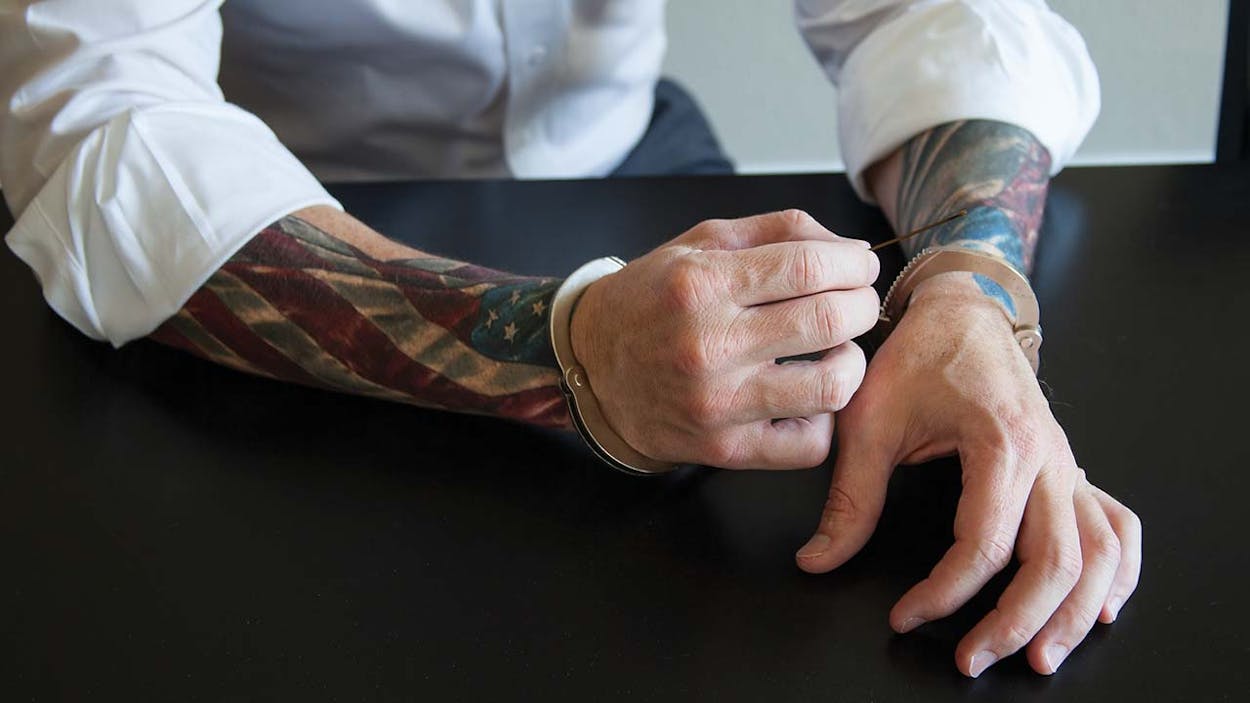Inside a tidy, two-story brick house on a cul-de-sac in an upscale neighborhood in the suburbs of Dallas, Clint Emerson turned his back on me and raised his hands above his head. I lifted the Ruger 9mm pistol he had handed me moments before and pointed the barrel between his shoulder blades. It felt intensely unpleasant to level a gun, even an unloaded one, at a retired Navy SEAL, partly because of the fraught nature of the act but mostly because I was well aware of my lowly station in his taxonomic view of the world, which is divided into three classes: sheepdogs (soldiers), wolves (bad guys), and sheep (noncombatants such as myself). Even more unnerving was the fact that Emerson simply doesn’t look the part. He isn’t a bearish, physically imposing good ol’ boy with hands like catcher’s mitts, like the late Chris Kyle (a former SEAL teammate of his). Emerson is the other kind of operative, the nondescript guy who can disappear in a crowd, whom you don’t see coming until it is too late. In gray slacks and a crisp white button-down shirt, he could easily be mistaken for a 41-year-old desk jockey. He’s lean and slightly weathered, like a man who has spent some time in the desert.
Emerson, who retired in January after twenty years in the Navy, served most of his career as a SEAL. His team was the first into Afghanistan, then Iraq, which wasn’t as much of a culture shock for him as one might imagine: though he graduated from Plano Senior High, he largely grew up in Saudi Arabia, where his father worked for Saudi Aramco. “Westerners are not exactly treated the best in Saudi Arabia, and as a child I didn’t care much for the people or the culture,” he said. “As an adult, I understand their culture better and accept that we were the visitors. But it left me with a certain dislike that led to becoming a SEAL and a desire to go back as a soldier. Now that I’ve been back to the Middle East many times, I’ve noticed kids, a portion of them, looking at me with a familiar stare—one of distaste. The same stare I had cast many times on Saudi men.”
During his time in the Navy, Emerson became what operators call a “violent nomad,” a globe-trotting ghost with a dizzyingly broad skill set. “Being a SEAL is nothing more than being a professional troublemaker,” he said. “The biggest quality is being adaptable, being creative.” He knows, for example, how to construct a “rectal concealment” device out of a cigar tube, a bulletproof vest out of duct tape and books, and a silencer out of a plastic bottle, wire mesh, and steel wool. Those are just three of the skills outlined in his book, 100 Deadly Skills: The SEAL Operative’s Guide to Eluding Pursuers, Evading Capture, and Surviving Any Dangerous Situation (Touchstone Books), which comes out on October 13.
In his book and in the security consulting business he runs, Emerson wants his readers and clients to understand that against seemingly impossible odds, there are courses of action that even sheep can take, if they’re willing to adopt the ways of sheepdogs and wolves. With that in mind, and with my strategic advantage ostensibly insurmountable, I followed Emerson’s instructions and asked him to try to disarm me, an assailant with a gun at his back. He briefly glanced over his shoulder, took half a step back, and stopped when the barrel contacted his vertebrae. Then, before my primary motor cortex could transmit a signal to my trigger finger, he pivoted out of the line of fire and trapped my wrist in his left armpit. His right elbow came wheeling around with disconcerting speed and stopped within inches of my face, to the eternal gratitude of my orbital bones. “You have to learn from the predators,” he said. “Because your natural-born instinct won’t be good enough.”







